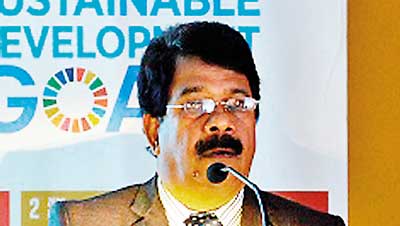Monday Feb 16, 2026
Monday Feb 16, 2026
Saturday, 9 September 2017 00:00 - - {{hitsCtrl.values.hits}}
By Chathuri Dissanayake
The Disaster Management Ministry has all response organisations on standby to respond if the prevailing bad weather conditions develop into a cyclone, Ministry Secretary S. S. Miyanawala said yesterday.
According to the Department of Meteorology, the rainy conditions in the south western part of the island are expected to last till Tuesday if the lower level atmospheric disturbance in the Bay of Bengal to the east of Sri Lanka continues to develop. “We are monitoring the situation closely; although there is no immediate threat of serious floods or landslides, we are on standby to respond if the situation develops further,” Miyanawala told Daily FT.
With flood and landslide disasters in the same region earlier this year, the Ministry has also developed a National Emergency Operations Plan to put in place a formal system for disaster response.
The finalised plan has already been sent to Cabinet for approval, Miyanawala said.
The Ministry is also drafting the National Relief and Recovery Plan to follow. These will also complement the National Disaster Management Plan 2018-2025 which is being drafted by the Ministry.
“The National Emergency Operations Plan will put a proper system in place to handle any disaster in future. Although this is what we do now as well, the national plan will lay down a proper guideline,” Miyanawala explained.
The country which has been facing one natural disaster after another has already spent Rs. 4.2 billion on compensation for crop damages over prevailing drought conditions in the northern part of the country. Further the Government has allocated Rs. 3.6 billion per month for dry rations distributions for 1.1 million families affected by the drought.
Miyanawala said that the drought conditions may ease with the onset of South West Monsoon by mid-September.
“In many of the drought-stricken areas, the impact is serious but not very visible. Even the water table has dried out so when the rains come in, it does not enrich the water table, instead it washes the soil away,” he said, explaining the complexity of the issue.